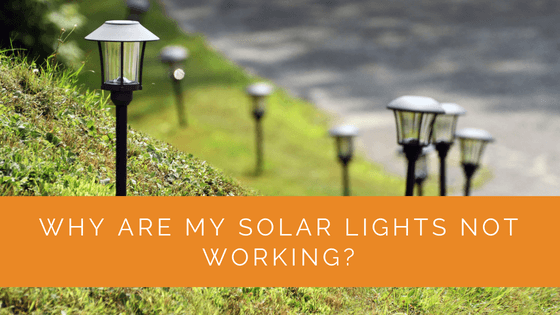Solar lights seem like an excellent idea when they are brand new. Installation is a cakewalk, and you can quickly relocate them without an electrical cord when seasons change.
Plus, unlike other artificial sources, they are pretty eco-friendly as they use sunlight to produce energy that doesn’t harm the environment or strain your wallet. What more can one actually ask for?
However, your feelings might change once you start facing some whims along the way. You will probably find them less valuable and reliable when solar lights stop working one day, and you are left wondering what’s wrong.
Not to worry!
In this guide, you will learn about some common reasons behind your solar light not working and how you can fix these issues.
Contents
Key Takeaways
- Solar lights may stop working due to various reasons, including batteries with pull tabs, insufficient light, faulty sensors, dirt or water covering solar panels, proximity to other light sources, dead batteries, defective LED bulbs, and cable issues.
- To fix solar lights that aren’t working, ensure they receive sufficient sunlight, replace batteries every three years, consider replacing faulty sensors, regularly clean the solar panels, avoid shading from objects or trees, and ensure the panels are not obstructed by glass.
- Solar lights are a cost-effective and eco-friendly lighting solution but may require maintenance to continue functioning properly.
8 Common Reasons Why Your Solar Lights Are Not Working
Solar lights are resilient and durable in design. They have a sturdy structure with effective features that makes them easy to install in outdoor spaces. Plus, they can withhold against different weather climates and illuminate your area brightly.
As such, today, they are becoming an environmentally friendly alternative to artificial lights in many offices, homes, and other spaces.
However, like all products, they are not untouchable to faults or troubles. At times, it could be possible for your solar lights to stop working. Though it does not mean you take them out and look for new ones, some reasons might have led to their unworking.
Let’s explore these reasons below:
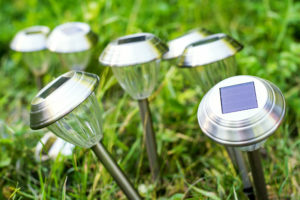
Batteries Feature a Pull Tab
If you are a first-time buyer and have newly purchased a solar light, you might not be aware that they come with a pull tab. It ensures that your battery doesn’t get consumed during shipping.
Alternatively, your battery and solar light won’t work until you remove this pull tab. Hence, get rid of the insulator after purchase and before installation.
Not Receiving Appropriate Light
A lack of light source is one of the primary reasons it is not working. If you have installed your solar lights in the shade or a covered area, there is a high chance they won’t work because of insufficient sunlight.
While it’s not necessary to place them directly under the sun, they do require a reasonable amount of light to charge their batteries.
Outdoor solar lights typically require six hours to charge, depending upon their type of panel and battery. It could also be possible that your light is installed under the direct sun and stopped working even then. The reason for this could be the growing plants and trees that are barring the sunlight.
The Sensor Has Become Faulty
The solar light sensor reacts to darkness, allowing it to go off in the daytime and switch on at night. But this won’t be possible with a faulty sensor unless you do it by bypassing the sensor manually, and nobody has enough time to do that.
If you have an ineffective sensor, it won’t differentiate between night and day. But how do you figure out that this is the reason for your lights not working?
Well, there is a way to check your sensors out.
During the night, cover the solar panel sensor with a cloth or hand; if it illuminates, it functions correctly. On the other hand, if it does not, the sensor is defective.
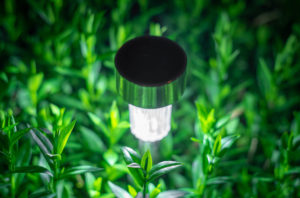
Covered with Dirt and Water
If your solar panels are covered with dirt, it can hinder their working. A layer of dirt or dust on your panels prevents sunlight absorption, leading to them not getting charged and not working.
This dust could get so dense and sticky that even a little light cannot reach your panels.
So, it is advised that you check your panels and clear them from time to time, especially during monsoon seasons.
In addition, though your solar lights are water-resistant and weatherproof, sometimes water can build up inside the solar panel, harming the circuit and internal wiring. You can take the panel head out from the post, wall, or pier mount to check for this.
Proximity to Other Light Sources
You already know that solar lights are equipped with sensors that feature photovoltaic cells to detect light sources, including artificial ones. So, if lights from other houses, garage lights, and street lights are working near your solar lights, it could be why they are not functioning correctly.
The reason is your light will think it is daytime and won’t switch on.
To handle this problem, check other light sources near your solar light and relocate them.
Batteries Have Stopped Functioning
A common issue with your solar light not working is its dead battery.
So, take it out and check the battery – if it has become old or worn out. It is possible that you have placed long-lasting batteries such as Nickel Metal Hydride Batteries, but they will also, after time, slow down in performance.
Remember that dead batteries can start to erode, leading to acid leaks and permanent damage to your solar-powered lamp. So, make sure to change your batteries after substantial use to ensure efficient working.
LED Bulbs Stops Working
Another possible reason for your solar-charged light stops working could be the LED bulb is defective or not working. In this scenario, even if your panel, the battery, and the sensors are fine, your light will not operate.
The downside here is you have to change your lights unless there is a chance that LED bulbs could be replaced.
Trouble with Cables
Solar lights work because of the sun that powers the light and feature no external power source, but they are still made of power cables. These cables connect different parts of the light – panels, sensors, and other units together.
Thus, if something is wrong with your cables, your light will not work.
Here, the solution is you either open your solar light or take it to a professional, so they can identify the source of the problem. It is best to choose the latter as professionals can know which cable is creating the problem better.
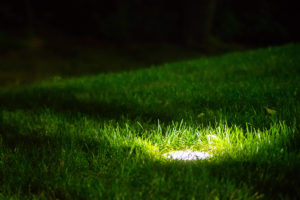
How to Fix the Issue of Solar Light Not Working?
While we may have discussed some common issues responsible for why your solar lights aren’t working, there are specific other fixes you should know.
If they stop working because of some other reason, you can fix your solar lights to get them to start working with the below-listed tips.
Place It Near Sufficient Light
Remember to place your solar light where they receive maximum sunlight. One common mistake people make is installing solar-powered lights per décor element. There is nothing wrong with it, except your light won’t receive the energy required to function. So, they would be a showpiece and a waste of money.
Replace the Batteries
Batteries are essential to solar lights and must be changed every three years. Most make the mistake of not checking them until the light stops operating. It is best to use NiMH and Li-ion batteries – they are great and have strong battery life.
Change the Sensor
After a certain point, your solar lamp sensor might stop working, but your lamp is still in good condition. So, what you can do is get it replaced and use your light again. Most manufacturers offer replacements, and you can enquire about this when you purchase.
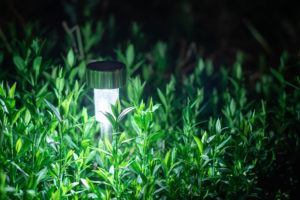
Clean Panels Regularly
After setting solar lights in their place, you must ensure their panels are always clean and maintained. Dust or dirt leads to them losing their charging and reduces lighting time.
You can use soapy water and a hose to clean panels every now and then in an effective manner. A clear solar panel will apply to the rechargeable batteries with enough energy that your space illuminates brightly.
Dodge the Shadows
After every three to four months, it is worth checking out your solar panel around midday to figure out how shaded they might be. Panels placed in the summer when shadows are short are specifically suspectable to shade coming out of nowhere as the season changes and the sun lowers.
Charging Behind Glass
While you can sit behind the glass and enjoy the full effects of the sun, solar panels can’t. Double or even triple-glazed windows can prevent the sun rays from reaching your solar panel. When considering charging, it is best to get your light outside in a sunny area.
To put it clearly, fewer the obstructions between the panel and the sun, better the charge and lighting.
Case Study: Troubleshooting Solar Lights in a Residential Garden
Background
A homeowner in a residential area had installed solar lights around their garden and pathway. These lights were an eco-friendly solution to brighten up the outdoor space without increasing electricity bills. However, the homeowner noticed that the lights were not functioning as expected, especially during the winter months.
Project Overview
The objective was to identify and resolve the issues causing the solar lights to malfunction. The homeowner enlisted the help of a solar lighting expert to diagnose the problems and implement effective solutions.
Implementation
Initial Assessment:
The expert began with a comprehensive assessment of the garden and the solar lights’ setup. This included checking the positioning of the lights, the condition of the solar panels, batteries, and sensors, as well as the surrounding environment.
- Identified Issues and Solutions:
- Insufficient Sunlight Exposure:
- Issue: The solar panels were partially shaded by trees and nearby buildings, reducing their ability to charge the batteries fully.
- Solution: The lights were repositioned to areas with maximum sunlight exposure, ensuring at least six hours of direct sunlight per day.
- Dirty Solar Panels:
- Issue: The panels had accumulated dirt and grime, further hindering their efficiency.
- Solution: The panels were cleaned using soapy water and a soft cloth. A regular cleaning schedule was established to maintain the panels’ efficiency.
- Dead Batteries:
- Issue: Some lights had batteries that had reached the end of their lifespan and were no longer holding a charge.
- Solution: The old batteries were replaced with new, high-quality NiMH batteries, known for their longer lifespan and better performance.
- Faulty Sensors:
- Issue: Certain lights were not turning on at night due to faulty sensors.
- Solution: The sensors were tested and replaced where necessary. Additionally, other light sources in the vicinity were adjusted to avoid interference.
- Insufficient Sunlight Exposure:
- Maintenance Plan: The expert provided the homeowner with a maintenance guide, including regular checks on the battery life, cleaning the panels, and ensuring the lights were not shaded or obstructed.
Results
After implementing these solutions, the solar lights in the garden and pathway operated efficiently, providing consistent illumination throughout the night. The homeowner reported a significant improvement in the lights’ performance and was pleased with the eco-friendly and cost-effective solution.
Summary
This case study demonstrates the importance of regular maintenance and proper installation of solar lights. By addressing issues such as inadequate sunlight exposure, dirty panels, dead batteries, and faulty sensors, homeowners can ensure their solar lights function optimally. Regular maintenance and timely interventions can extend the lifespan of solar lighting systems, providing a sustainable and cost-effective solution for outdoor illumination.
Our team is dedicated to offering expert guidance and support for troubleshooting and maintaining solar lighting systems, ensuring our clients achieve the best results from their investment in renewable energy.
Expert Insights on Solar Lights Not Working
One of the most common issues with solar lights not functioning properly is insufficient sunlight exposure. Even a slight shadow from a nearby tree or building can significantly reduce the efficiency of the solar panels, leading to inadequate charging. Regular maintenance and correct positioning are crucial for optimal performance.
Solar Energy Specialist
Over time, solar light batteries can lose their ability to hold a charge, especially if they haven’t been replaced in a few years. It’s essential to check and replace batteries regularly, preferably with high-quality NiMH or Li-ion options, to maintain the longevity and brightness of the lights.
Renewable Energy Consultant
Sensor malfunctions can cause solar lights to fail to turn on at night. Testing the sensors by covering them or moving the lights to a different location can help diagnose and fix the issue, ensuring the lights function as intended.
Electrical Engineer
Our Expertise in Solar Lights
At Solar Panels Network, we’re here to provide you with valuable information and support regarding solar lighting. With our experience and understanding of the solar lighting industry, our team of experts is prepared to assist you in finding the right lighting solution for your needs. Whether you’re interested in improving your outdoor spaces, conserving energy, or adopting a more sustainable approach, we’re well-equipped to help. Please feel free to contact us with any questions or inquiries.
The Bottom Line
Solar lights are beautiful, durable, cost-effective, and a green way to lighten your backyard or garden. Nevertheless, they are not immune to problems and issues like other products. They can stop working for many reasons – lack of light, dead battery, and dirty panels.
So, before you take them out and dispose of them, it is best to consider the reasons for their improper functioning and look for solutions.
Hopefully, this article will help you the next time your lights stop working.
About the Author
Solar Panels Network stands at the forefront of solar energy solutions, driven by a team of seasoned solar engineers and energy consultants. With over decades of experience in delivering high-quality solar installations and maintenance, we are committed to promoting sustainable energy through customer-centric, tailored solutions. Our articles reflect this commitment, crafted collaboratively by experts to provide accurate, up-to-date insights into solar technology, ensuring our readers are well-informed and empowered in their solar energy decisions.

